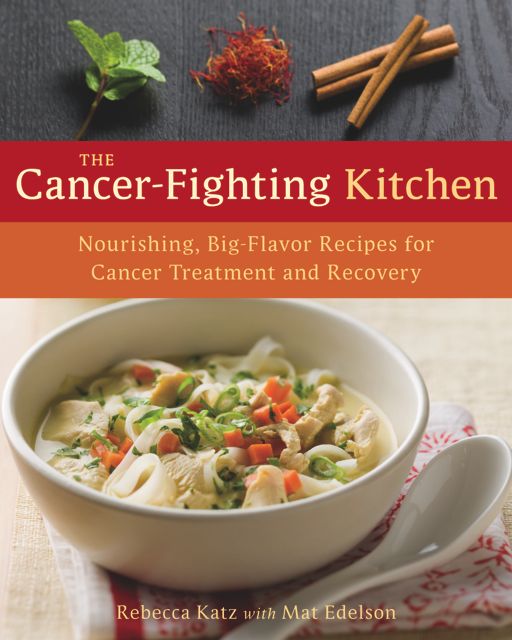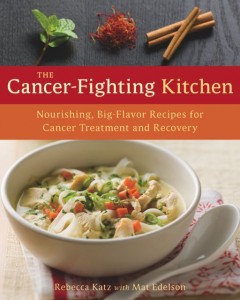
 Your doctor has told you to “eat a balanced diet,” but when you’re going through cancer treatments, sometimes food just doesn’t taste right. You can lose your appetite, easily get sick to your stomach, or find that eating most foods is similar to chewing cardboard. Maybe you’ve seen a nutritionist, and you’ve got a list of vitamins and minerals running around in your head, but no idea how to start turning that information into something you’d actually like to eat.
Your doctor has told you to “eat a balanced diet,” but when you’re going through cancer treatments, sometimes food just doesn’t taste right. You can lose your appetite, easily get sick to your stomach, or find that eating most foods is similar to chewing cardboard. Maybe you’ve seen a nutritionist, and you’ve got a list of vitamins and minerals running around in your head, but no idea how to start turning that information into something you’d actually like to eat.
Enter Rebecca Katz, your personal culinary translator. Consultant, teacher, speaker, author, and first and foremost-cook-Rebecca has created (with co-author Mat Edelson) a book just for cancer patients and their caregivers. It’s called Cancer-Fighting Kitchen, and inside, she shares delicious recipes sure to get you eating again, as well as tips on what foods battle various side effects.
“Nutritional analysis can lead to culinary paralysis,” she says. “You can have all this information, but if you can’t turn it into something that’s yummy and nourishing to eat, it’s only information. My job is to help people rediscover a healthy connection to food.”
Having cared for her father when he was going through throat cancer, Rebecca knows well the frustration of watching someone you love suffer from being unable to eat. “I had gone through culinary school,” she says, “and I was a chef in Northern California, but I didn’t know how to cook for him. It was difficult for me, as before the cancer, my father had never met a food he didn’t like. But he was undergoing radiation, and taste changes became an issue. No matter what kind of cook you think you are, trained or not, it’s a whole different ball game when you’re working with someone who’s going through cancer treatment.”
Rebecca tried to find some resources to help, but had little luck. “There was nothing I could turn to that provided what I would call healthy and delicious options. You know, things that were really appealing, that would turn on someone’s taste buds.”
As fate would have it, she got a call from the Commonweal Cancer Health Program in Bolinas, California, to cook for a retreat. (She is now senior chef and nutritional educator there.) That experience increased her desire to work with cancer patients. “What fascinated me were the transient taste changes-I wanted to figure out how to turn people on to food, when they had every reason to be turned off. After all, to find nourishment during treatment can make the difference between a really successful treatment and not being able to make it through.”
Connecting the latest scientific research with her own talent for creating delicious foods, Rebecca helps people navigate the inevitable changes that occur throughout the cancer journey. She includes a chapter on dealing with taste changes-if things taste metallic, for instance, she recommends adding maple syrup, lemon juice, or nut creams to recipes. If things are without taste, try sea salt. Another section, called the “culinary pharmacy,” links herbs and spices to their various health benefits. For example, ginger can help reduce nausea, allspice is a great digestive aid, and cumin stimulates the appetite.
“In the book I have a whole menu-planning section,” she says. “Let’s say you’re about to go into chemotherapy. I have things you may want to eat before treatment, and things you may want to eat afterwards. If you’re dealing with anemia, there are certain recipes for you. Or if you’re struggling with nausea-I have a recipe for homemade ginger ale with frozen grapes, or a cinnamon ginger tea.”
For Rebecca, it’s all about making food taste good again, so as a cancer patient, you’ll want to eat. However, she says you will need to change how you go about it. “When you’re going through treatment, it’s not about sitting down and eating a big meal. You learn to deal in smaller portions. Different foods become little life rafts, tasty bites of ‘yum.’ Maybe every hour you take a few bites of something, or a few swallows of a smoothie. You make one of the recipes, then you freeze most of it in single-serving containers. Later, when you get hungry-or if your hunger signals are screwed up, when you know it’s time to eat-you defrost a little bit and have a few bites. It’s about having different things available at different times.”
The whole idea is to be able to eat well-and enjoy it-even when you may not feel like it. “My philosophy,” she adds, “is the power of yum. I want great taste and great nutrition to sit joyously together at the table. During cancer treatments, you just can’t have great nutrition if you don’t have great taste.”
For more information, see Rebecca’s website, or get your own copy of Cancer-Fighting Kitchen at Amazon.

